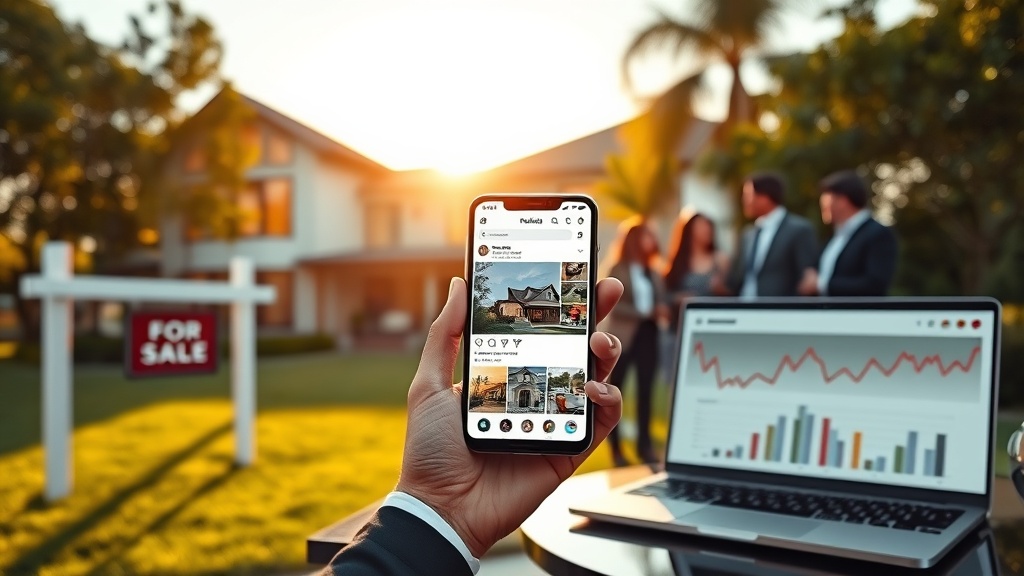Top 5 Social Media Strategies Successful Real Estate Agents Swear By

" "
In the ever-evolving world of real estate, staying ahead of the game is essential. One of the most dynamic avenues for real estate agents to leverage today is social media. With billions of users spread across various platforms, social media has become a goldmine for real estate professionals seeking to broaden their reach, engage with potential clients, and ultimately close more deals.
In this blog post, we'll delve into the top five social media strategies that successful real estate agents swear by. We'll explore each strategy in detail, offering real-world scenarios, historical context, current trends, and glimpses into the future of real estate marketing through social media.
1. Building a Strong Personal Brand
Historical Context
The concept of personal branding isn't new. Historically, real estate has always been a relationship-driven industry, where trust and reputation are paramount. Before the digital age, agents relied heavily on word-of-mouth and local networking.
Current Trends
Today, social media provides real estate agents with the perfect platform to amplify and build their personal brands. Platforms like Instagram and LinkedIn are particularly popular for showcasing personal achievements, sharing client testimonials, and posting insights into the real estate market.
Real-World Scenario
Consider a real estate agent who specializes in luxury properties. By consistently sharing high-quality images of stunning homes, along with insightful market analyses and personal success stories, the agent builds a recognizable brand that attracts high-net-worth clients.
Future Implications
As the digital landscape continues to evolve, personal branding will become even more crucial. Agents who successfully establish themselves as thought leaders in their niche will likely have a significant competitive advantage.
2. Utilizing Video Content Effectively
Historical Context
Video content has taken the world by storm. From television to YouTube, visual storytelling has always been an effective way to connect with audiences.
Current Trends
Platforms like TikTok and Instagram Reels have made video content more accessible than ever. Real estate agents are using these platforms to give virtual tours, offer home buying tips, and even showcase neighborhood highlights.
Real-World Scenario
Imagine an agent who creates a series of short, engaging videos providing tips for first-time homebuyers. These videos not only demonstrate the agent's expertise but also build a connection with potential clients who are navigating the home-buying process for the first time.
Future Implications
As technology advances, virtual reality (VR) and augmented reality (AR) could play significant roles in real estate marketing. Agents who adapt to these technologies early on may find themselves at the forefront of the industry.
3. Engaging with the Community
Historical Context
Community engagement has always been a pillar of real estate success. Whether through sponsoring local events or participating in community service, real estate agents have historically built relationships by being active members of their communities.
Current Trends
Social media offers new ways for agents to engage with their communities. Facebook Groups, for example, provide platforms for discussions about local issues, while Instagram Stories can be used to highlight community events.
Real-World Scenario
Consider an agent who regularly participates in and posts about local charity events or neighborhood clean-ups. By doing so, the agent not only enhances their reputation but also builds genuine connections with community members.
Future Implications
As more people turn to social media for local news and updates, real estate agents who consistently engage with their communities online will likely see increased trust and loyalty from potential clients.
4. Leveraging Data Analytics
Historical Context
Traditionally, real estate marketing relied heavily on intuition and experience. However, the digital age has ushered in a new era of data-driven decision-making.
Current Trends
Social media platforms offer a wealth of data analytics tools that can help agents understand their audience and refine their marketing strategies. Facebook Insights, Instagram Analytics, and LinkedIn Analytics are just a few examples.
Real-World Scenario
An agent notices that their Instagram posts about newly listed properties receive higher engagement on weekends. By leveraging this data, the agent adjusts their posting schedule to maximize reach and engagement.
Future Implications
As data analytics tools become more sophisticated, real estate agents who harness this information will be better equipped to target their ideal clients and optimize their marketing efforts.
5. Creating Valuable Content
Historical Context
Providing value has always been a cornerstone of successful marketing. In real estate, this often meant offering market insights or home-buying tips.
Current Trends
Content marketing is more important than ever. Agents who create valuable content that educates, informs, and entertains their audience are more likely to build a loyal following.
Real-World Scenario
Imagine an agent who writes a blog about the home-buying process, complete with tips, checklists, and financial advice. By sharing this content on social media, the agent establishes themselves as a knowledgeable resource, attracting potential clients looking for guidance.
Future Implications
As content consumption patterns continue to evolve, agents who are adept at creating diverse and valuable content will likely stand out in a crowded market.
Conclusion
In the fast-paced world of real estate, leveraging social media effectively can be the key to success. By building a strong personal brand, utilizing video content, engaging with the community, leveraging data analytics, and creating valuable content, real estate agents can not only stay ahead of the competition but also forge meaningful connections with their audience.
As technology and social media platforms continue to evolve, the agents who adapt and innovate will be the ones who thrive. So, whether you're a seasoned real estate pro or just starting your career, consider integrating these strategies into your social media approach. Your future clients are just a click away!











